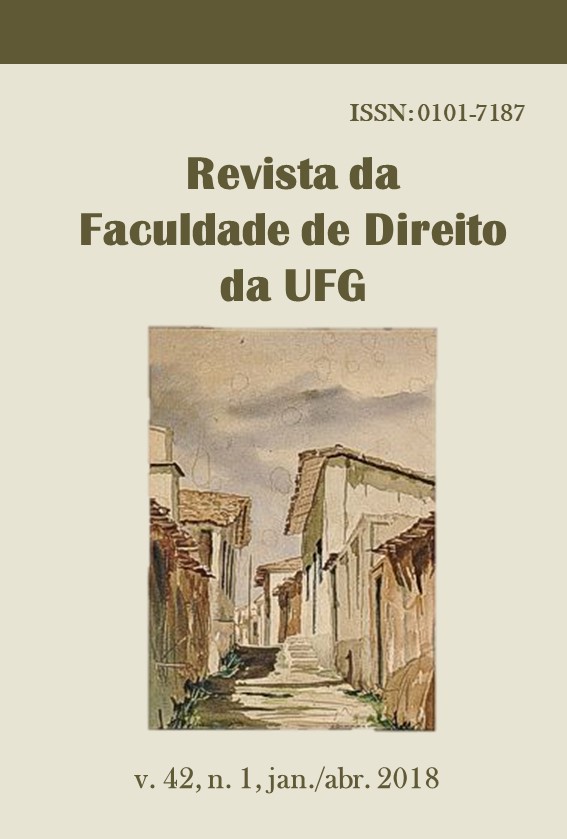Socio-environmental rights and the riddle of history
DOI:
https://doi.org/10.5216/rfd.v42i1.53334Palavras-chave:
Direito, Desenvolvimento, Meio ambienteResumo
Abstract: Broadly speaking, this paper is about the relationship of the human rights tradition to substantive issues of social justice, including class exploitation and environmental destruction. These themes I take to be of global concern, but I will examine them today as they arise from conflicts and struggles situated in Brazil. The key to the argument is to show that the human rights tradition recognizes necessary features of self-determination, and that claims for socio-environmental rights in Brazil and elsewhere derive their legitimacy from the same kind of argument that justifies individual rights, such as the 1948 United Nations Declaration, and collective rights, such as the International Covenant on Economic, Social and Cultural Rights of 1966 and the United Nations Declaration of the Rights of Indigenous Peoples of 2007. That is, I will try to show that individual, collective and socio-environmental rights are each necessary conditions but, on their own, insufficient conditions for the possibility of self-determination. The need for such rights emerges in the history of the struggle for justice. This this paper will also defend the claim that the universality of rights necessarily emerges from the historicity of social life and solves what Marx calls the “riddle of history.” Keywords : Socio-enviromental rights; riddle of history.
Resumo: De um modo geral, este artigo trata da relação da tradição dos direitos humanos com questões substantivas de justiça social, incluindo a exploração de classes e a destruição ambiental. Esses temas são de interesse global, mas vou examiná-los hoje, pois eles surgem de conflitos e lutas no Brasil. A chave do argumento é mostrar que a tradição dos direitos humanos reconhece as características necessárias à autodeterminação, e que as reivindicações por direitos socioambientais no Brasil e em outros lugares derivam sua legitimidade do mesmo tipo de argumento que justifica os direitos individuais, como o Declaração das Nações Unidas de 1948, e direitos coletivos, como o Pacto Internacional sobre Direitos Econômicos, Sociais e Culturais de 1966 e a Declaração dos Direitos dos Povos Indígenas das Nações Unidas de 2007. Ou seja, tentarei mostrar que os direitos individuais, coletivos e Direitos socioambientais são, cada um, condições necessárias, mas, por si só, condições insuficientes para a possibilidade de autodeterminação. A necessidade de tais direitos surge na história da luta pela justiça. Este artigo também defenderá a afirmação de que a universalidade dos direitos surge necessariamente da historicidade da vida social e resolve o que Marx chama de "enigma da história".
Downloads
Referências
KAMENKA, Eugene, Ed., The Portable Karl Marx, London: Penguin, 1983.
MARX, Karl, Capital I, Trans., Samuel Moore and Edward Aveling, New York : International Publishers, 1967.
______. Speech at Anniversary of Peoples’ Paper. Retrieved from
Disponível em <https://www.marxists.org/archive/marx/works/1856/04/14.htm>.
SAMUEL MOYN, The Last Utopia Human Rights in History, (Cambridge : Harvard University Press, 2010).
JACQUES RANCIÈRE, “Who is the Subject of the Rights of Man?”, South Atlantic Quarterly, 103 (2/3), 303.
Downloads
Publicado
Como Citar
Edição
Seção
Licença
Os Autores que publicam nesta revista concedem à Revista da Faculdade de Direito da UFG uma licença mundial, sem royalties, sujeita aos termos e condições da Licença Jurídica Creative Commons Atribuição 3.0 Brasil Creative Commons Attribution License
Os autores concedem à RFD UFG todos os direitos autorais sobre os artigos nela publicados, que os mantêm com exclusividade até o advento de domínio público sobre os mesmos.
























